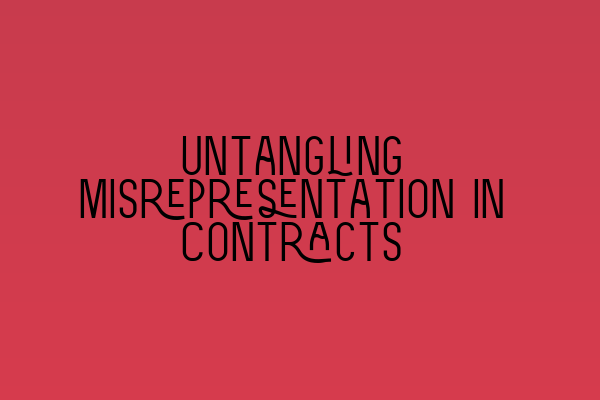Untangling Misrepresentation in Contracts
Misrepresentation is a critical aspect of contract law that can have significant implications on the validity and enforceability of a contract. Understanding the concept of misrepresentation is essential for both solicitors and individuals entering into contracts.
In this article, we will dive deep into the intricacies of misrepresentation, examine its different forms, and analyze its impact on contractual obligations. We will also explore some notable cases and provide legal insights to help you navigate through this complex area of contract law.
What is Misrepresentation?
Misrepresentation refers to false statements, assertions, or information made by one party to another during the negotiation or formation of a contract. These erroneous representations either induce the other party to enter into the contract or significantly influence their decision-making.
Misrepresentation can be innocent, negligent, or fraudulent in nature, depending on the intent and knowledge of the party making the false statement. Each form of misrepresentation carries its own legal consequences and remedies, which we will discuss in detail later in this article.
Types of Misrepresentation
There are three main types of misrepresentation: innocent, negligent, and fraudulent.
Innocent Misrepresentation
Innocent misrepresentation occurs when a party makes a false statement genuinely believing it to be true, without any intention to deceive. In such cases, the innocent party may have the right to rescind the contract and claim damages.
For example, if a seller mistakenly claims that a piece of artwork is an original painting by a renowned artist, the buyer may have grounds to rescind the contract if it is later discovered to be a forgery.
Negligent Misrepresentation
Negligent misrepresentation arises when a party makes a false statement without taking reasonable care in verifying its accuracy. The party making the misrepresentation may not have intended to deceive, but their negligence in providing accurate information can still result in legal consequences.
An example of negligent misrepresentation is when a real estate agent wrongly assures a buyer that a property is free from any structural defects, leading the buyer to purchase the property. If the buyer later discovers structural issues, they may have grounds to seek damages for the agent’s negligent misrepresentation.
Fraudulent Misrepresentation
Fraudulent misrepresentation involves the intentional and dishonest communication of false information with the intention to deceive another party. Fraudulent misrepresentation is regarded as a serious offense, and the victim of such misrepresentation can seek various legal remedies, including rescission, damages, or even punitive damages.
For instance, if a car salesman knowingly provides false mileage information to a buyer to increase the value of the vehicle, the buyer can take legal action for fraudulent misrepresentation.
The Impact of Misrepresentation
Misrepresentation can significantly impact the validity and enforceability of a contract. If a misrepresentation is deemed material, meaning it influenced the decision of the innocent party to enter into the contract, the innocent party may have the right to rescind the contract and claim damages.
In some cases, courts may also have the power to modify or declare the contract void if the misrepresentation is deemed fraudulent or egregious.
It is crucial for solicitors and individuals involved in contract negotiations to thoroughly examine and evaluate any statements made by the other party. It is equally important for solicitors to ensure their clients are fully informed about their rights and possible remedies concerning misrepresentation.
Notable Cases and Legal Insights
Several significant court cases have shaped the principles and application of misrepresentation in contract law. To gain a deeper understanding of the subject, it is worthwhile to explore some of these cases:
- Exploring the Impact of Frustration on Contractual Obligations: Legal Insights
- Interpreting Contractual Clauses: Unlocking the Hidden Meanings
- Legal Aspects of Business Contracts: Key Considerations for Entrepreneurs
- SQE Contract Law vs. Traditional Qualifications: A Comparative Analysis
- Agreements in Contract Law: Understanding Its Various Types
By examining these related articles, you can gain a broader perspective on various aspects of contract law and enhance your knowledge in this field.
Conclusion
Misrepresentation is a complex area of contract law that requires careful consideration and understanding. The different types of misrepresentation and their legal consequences can significantly impact the validity and enforceability of contracts.
As solicitors, it is our duty to guide and inform our clients about misrepresentation and its potential implications. By staying well-informed and keeping up-to-date with relevant cases and legal insights, we can effectively navigate this intricate terrain and ensure the best possible outcomes for our clients.
